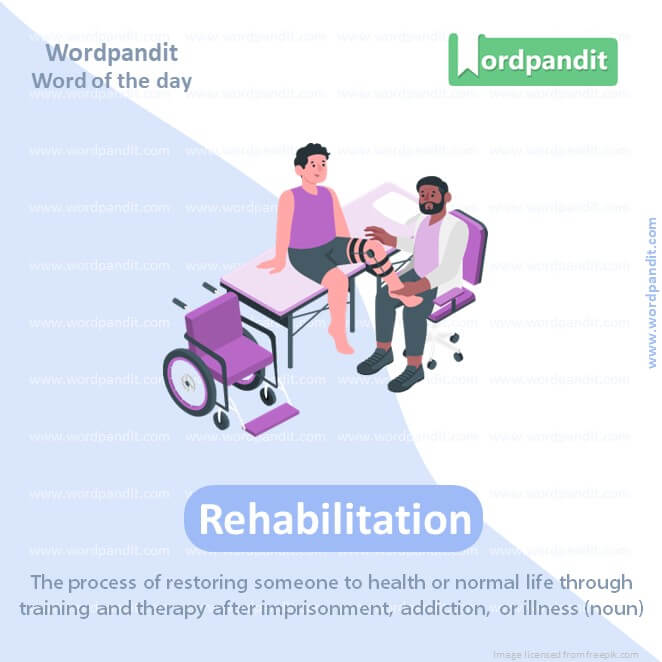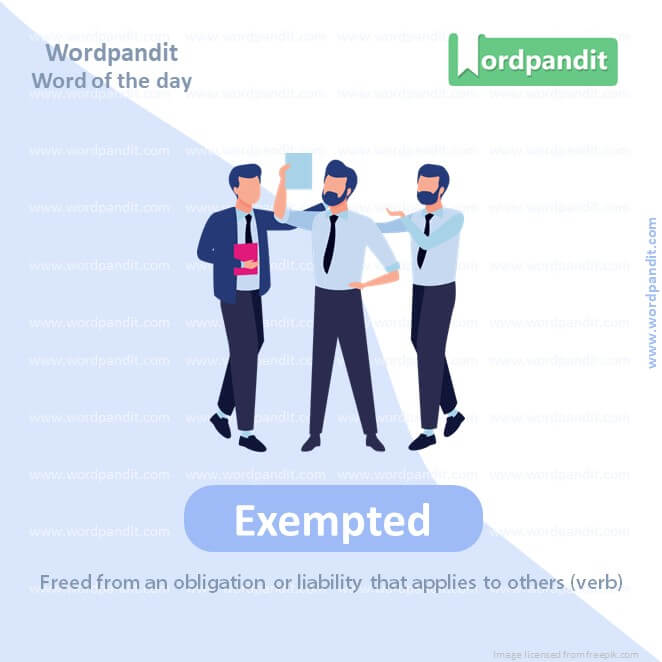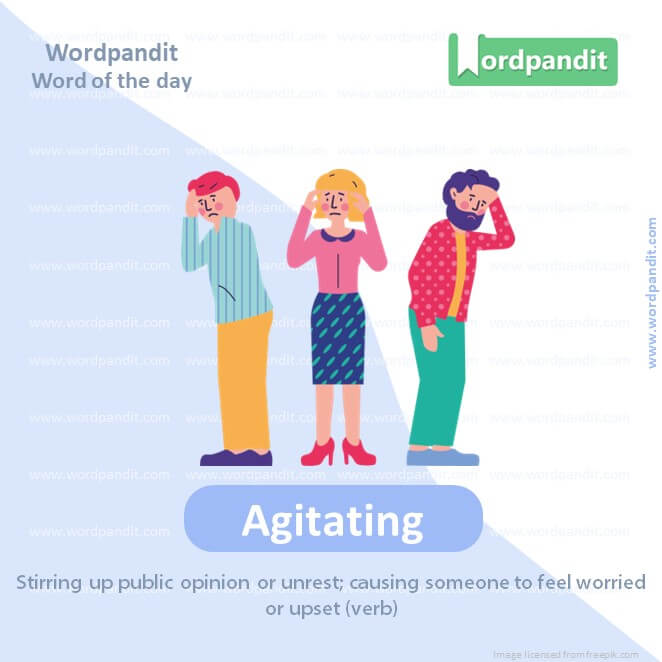Daily Vocabulary Words: List of Daily Used Words in Leading Indian Newspapers
Hi there. Welcome to this special section @ Wordpandit. Our endeavour here is straightforward: highlighting daily vocabulary words that you would come across in leading newspapers in the country. We have included the following newspapers in our selection:
• The Times of India
• The Economic Times
• Hindustan Times
• Mint
• Indian Express
We are putting in extensive work to develop your vocabulary. All you have to do is be regular with this section and check out this post daily. This is your repository of commonly used words; essentially, we are posting a list of daily used words. Hence, this has significant practical application as it teaches you words that are commonly used in leading publications mentioned above.
Visit the website daily to learn words from leading Indian newspapers.

WORD-1: Rehabilitation
CONTEXT: The government will provide a one-time compensation of ₹2 lakh each to Muslim Marriage Registrars for their rehabilitation after the Act is repealed.
SOURCE: Hindustan times
Explanatory Paragraph: Rehabilitation is like helping someone learn to walk again after they’ve hurt their leg. It means helping someone get better after they’ve been sick or injured, or helping them to live a good life again after they’ve made mistakes.
Meaning: The process of restoring someone to health or normal life through
training and therapy after imprisonment, addiction, or illness (noun).
Pronunciation: ree-huh-bil-ih-TAY-shun
Synonyms: recovery, restoration, recuperation, healing
Usage Examples:
1. He underwent rehabilitation after the surgery.
2. The rehabilitation center focuses on helping people with addiction.
3. Rehabilitation of the old building took two years.
4. The program aims at the rehabilitation of former prisoners.

WORD-2: Exempted
CONTEXT: He said the tribal community will be exempted from the ambit of the Uniform Civil Code.
SOURCE: Hindustan times
Explanatory Paragraph: Exempted is like when you don’t have to do chores because you already did your homework. It means being freed from a rule or obligation that others have to follow.
Meaning: Freed from an obligation or liability that applies to others (verb).
Pronunciation: ig-ZEMP-tid
Synonyms: excused, spared, released, relieved, absolved
Usage Examples:
1. Small businesses were exempted from the tax increase.
2. She was exempted from jury duty due to her medical condition.
3. Donations to the charity are exempted from taxation.
4. Students were exempted from the final exam due to their high grades.

WORD-3: Agitating
CONTEXT: Thousands of farmers remain camped at Khanauri and Shambhu borders with their tractor-trolleys and trucks agitating for their demands.
SOURCE: Hindustan times
Explanatory Paragraph: Agitating is like when you shake a snow globe to make the snow move all around. It means stirring something up or causing people to feel worried or upset.
Meaning: Stirring up public opinion or unrest; causing someone to feel worried
or upset (verb).
Pronunciation: AJ-ih-tay-ting
Synonyms: upsetting, disturbing, provoking, exciting, stirring
Usage Examples:
1. The proposed law was agitating the community.
2. He was agitating for change in the workplace.
3. The news had an agitating effect on her.
4. The machine was agitating the liquid vigorously.
WORD-4: Galvanised
CONTEXT: The death of a farmer in clashes with security forces galvanised the protest, with Samyukt Kisan Morcha (SKM), which had till then stayed away, joining the stir.
SOURCE: Hindustan times
Explanatory Paragraph: Galvanised is like when everyone gets really excited and starts cleaning up the park together because someone inspired them to help. It means being stimulated into action, especially into taking collective action.
Meaning: Shocked or excited, typically into taking action (verb).
Pronunciation: GAL-vuh-nized
Synonyms: stimulated, energized, motivated, spurred, aroused
Usage Examples:
1. The community was galvanised by the injustice.
2. She was galvanised into action by the urgency of the situation.
3. The speech galvanised the crowd.
4. The crisis has galvanised global efforts.
WORD-5: Intuitive
CONTEXT: NASA and Intuitive Machines have been getting data from the lander and think that most scientific instruments are still functional.
SOURCE: Hindustan times
Explanatory Paragraph: Intuitive is like knowing you’ll like the chocolate ice cream before you even taste it because you love chocolate. It means knowing or understanding something without needing to think it out or use reason.
Meaning: Using or based on what one feels to be true even without conscious reasoning (adjective).
Pronunciation: in-TOO-ih-tiv
Synonyms: instinctive, natural, spontaneous, inherent, automatic
Usage Examples:
1. She had an intuitive understanding of children’s needs.
2. His decisions are highly intuitive rather than analytical.
3. The software is designed to be intuitive and user-friendly.
4. Intuitive insights often lead to creative breakthroughs.
WORD-6: Stirred
CONTEXT: the AI’s refusal to take a stand against pedophilia has stirred up heated debates and conversations.
SOURCE: Hindustan times
Explanatory Paragraph: Stirred is like when you mix your soup with a spoon to make sure everything is mixed well. It can also mean being emotionally moved or excited.
Meaning: Moved or mixed by passing a spoon or other implement around in it; emotionally affected (verb).
Pronunciation: STURD
Synonyms: mixed, blended, agitated, moved, touched
Usage Examples:
1. The speech stirred the audience.
2. She stirred the paint before applying it.
3. The story stirred emotions among the readers.
4. He was deeply stirred by the music.

WORD-7: Resuscitated
CONTEXT: The police and paramedics tried to resuscitate her, but it was too late. She was pronounced dead at the scene.
SOURCE: Hindustan times
Explanatory Paragraph: Resuscitate is like when someone gives a wilting plant water and sunlight to make it healthy and growing again. It means to revive someone from unconsciousness or apparent death.
Meaning: To revive someone from unconsciousness or apparent death (verb)
Pronunciation: re-SUS-si-tate
Synonyms: revive, revive, rejuvenate, restore, revitalize
Usage Examples:
1. Paramedics managed to resuscitate the patient.
2. Efforts to resuscitate the economy are underway.
3. The firefighter used CPR to resuscitate the victim.
4. She was successfully resuscitated after the accident.
WORD-8: Stabbed
CONTEXT: A 17-year-old migrant boy from Nicaragua was stabbed in the back by a group of masked assailants in Times Square on Thursday evening, sparking a massive manhunt for 16 suspects, according to NYPD.
SOURCE: Hindustan times
Explanatory Paragraph: Stabbed is like when someone pokes a balloon with something sharp and it pops. It means suddenly pushing a sharp object into something, usually with force.
Meaning: Thrust a knife or other pointed weapon into (someone) so as to wound or kill (verb).
Pronunciation: STABD
Synonyms: pierced, speared, gored, thrust, impaled
Usage Examples:
1. He was stabbed during the altercation.
2. She stabbed the air with her finger to emphasize her point.
3. The character in the play is stabbed with a dagger.
4. He accidentally stabbed himself while carving the wood.

WORD-9: Confronted
CONTEXT: The teen was with his friends on his first visit to the iconic tourist destination when the attackers confronted them on West 42nd Street near Eighth Avenue around 5:30 p.m., shouting
SOURCE: Hindustan times
Explanatory Paragraph: Confronted is like when you have to finally deal with something you’ve been avoiding, like telling your friend you lost their favorite toy. It means facing a challenge or something difficult directly.
Meaning: To face, meet, or deal with a difficult situation or person (verb).
Pronunciation: kuhn-FRUNT-ed
Synonyms: faced, tackled, encountered, challenged, opposed
Usage Examples:
1. She confronted her fears.
2. The team confronted many obstacles.
3. He was confronted by an angry crowd.
4. Issues need to be openly confronted for a resolution.
WORD-10: Profusely
CONTEXT: The gang then chased the boy, and one of them stabbed him in the lower back, leaving him bleeding profusely on the ground, police said.
SOURCE: Hindustan times
Explanatory Paragraph: Profusely is like when a water hose is turned on all the way and water comes out really fast. It means doing something abundantly or to a great degree.
Meaning: To a great degree; in large amounts (adverb).
Pronunciation: pro-FYOOZ-lee
Synonyms: abundantly, copiously, excessively, extensively, liberally
Usage Examples:
1. He apologized profusely for his mistake.
2. The flowers bloomed profusely in the spring.
3. She was sweating profusely after the workout.
4. The author thanked her supporters profusely.
Vocabulary list
In navigating the seas of language learning, a ‘vocabulary list’ can often be a dependable guiding star. These collections of words serve as a focused learning tool, yet the technique of mastering a ‘vocabulary list’ effectively requires more than simple perusal. It calls for a smart, sustained approach that amalgamates understanding, memory, and application.
Exploring a ‘vocabulary list’ should be more than a one-way trip. It ought to be more like a round trip, wherein you learn the words, come back to review them, and then set out again for a new voyage. This repeated interactive way of exploring the ‘vocabulary list’ aids in solid memory retention and effective learning.
Next, while dealing with a ‘vocabulary list’, employing memory-boosting techniques can bolster your retention substantially. Here, mechanisms like spaced repetition systems and flashcards can simplify and streamline the process. Moreover, associating words on your ‘vocabulary list’ with visual cues or personal stories can help your brain make strong connections, strengthening your recall ability.
However, the most crucial aspect of learning from a ‘vocabulary list’ is active application. Conquering a list without using the words in real-world contexts might leave you with fleeting knowledge. Hence, make it a point to integrate these learnt words into your daily interactions, be it on social media, in email exchanges, or casual conversations. The regular utilization reinforces your understanding and brings the ‘vocabulary list’ to life.
Conclusively, the ‘vocabulary list’ is a treasure trove in a language learner’s quest, waiting to be unlocked strategically. Through the trinity of review, memory-enhancing techniques, and active application, one can master any ‘vocabulary list’. So, take charge of your learning journey and set sail with your ‘vocabulary list’, charting the vast and fascinating seas of language.










